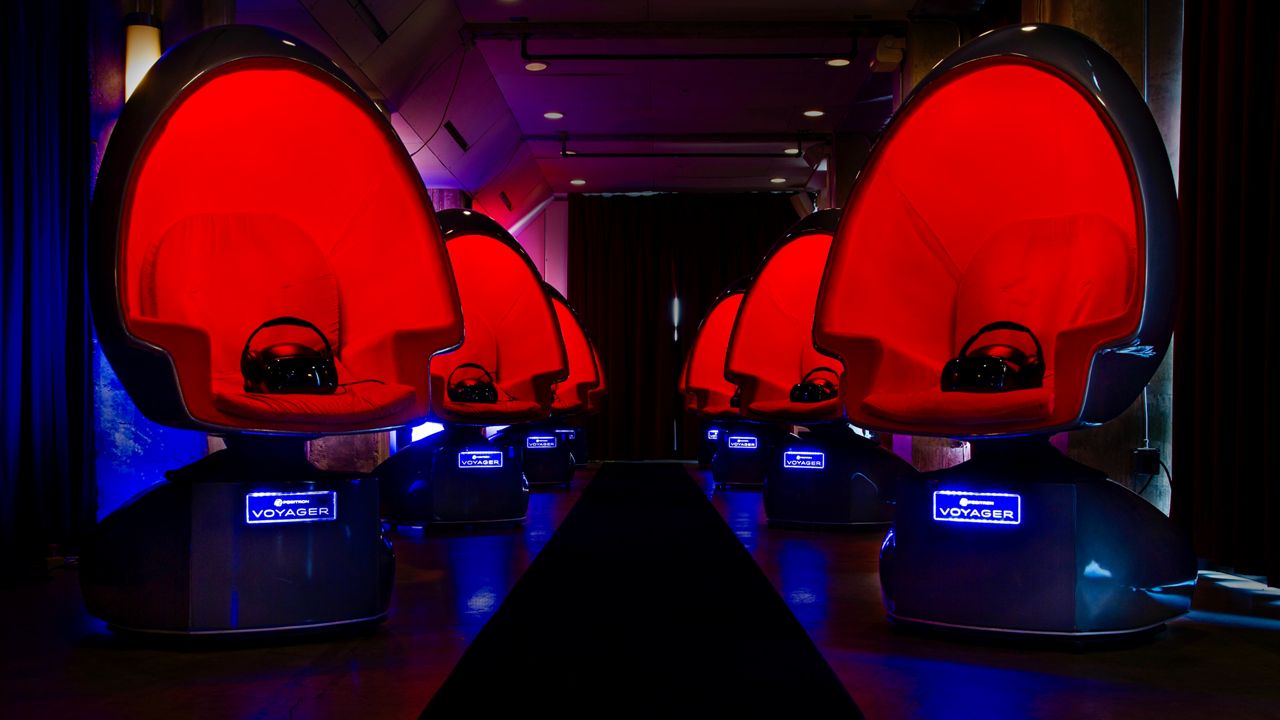LOS ANGELES — Soon, you may only need to visit your local movie theater to see what it feels like to be on top of Machu Picchu.
Just hop on Positron's virtual reality motion pod and don a VR headset, and it'll feel like you've been transported above the Amazon rainforest.
This kind of experience is not like watching a movie on a 50 by 50-foot wide screen, said Jeffrey Travis, the CEO of Positron, a Los Angeles-based virtual reality technology and entertainment company.
Travis said that sitting inside Positron's Voyager VR motion chair makes you feel like you're actually there.
"When you go to a regular movie theater, you sit down in a chair and watch a story on a 2D screen," said Travis to Spectrum News. "With VR [headsets] in our chairs, you're actually inside the film. It's as if you were right there through that screen, and the film's story is happening around you. You'll feel the cars whizzing by you, the wind blowing … It's a far more immersive and realistic way of experiencing a film rather than sitting down and watching it."
With the advancement of technology, Positron, based at the Row DTLA, is among several companies pioneering the future of film, location-based cinema, and live entertainment experience through virtual reality.
Virtual reality is not new. The multi-billion dollar VR industry has been around for a long time, but it wasn't until the 2010s, when VR headsets became a thing, that it began to gain popularity. Most people associate VR with video gaming, but there's a growing demand for film content — or VR cinema.
But rather than just watching a movie through a VR headset, Positron's Voyager chairs take the experience one step further.
Guests sit down in what looks like a half-open egg-shaped lounge chair. Once inside, guests put on the VR headsets, and as they watch the virtual reality movie, the pod moves — it turns, whirls, releases odors and provides other haptic feedback.
"We like to say we're the front row seat to the metaverse," said Travis, adding that guests won't feel nauseous when the pod slowly moves as they watch the movie. "This is part of the future of cinema and entertainment."
Travis combined his technical experience as a biomedical engineer, who began his career designing motion platforms for simulators, with his filmmaking abilities to make the Voyager pod and enhance a viewer's VR viewing experience.
Before starting Positron, Travis was a budding filmmaker who directed films, shorts, television and commercials. His short animated film "Flatland The Movie," starred Martin Sheen and Kristin Bell.
"It was that love of storytelling and film as a director combined with using technology to make the VR story better that led to the [Voyager chair] prototype," he said.
"If this is what I felt like would make a better viewing experience," he said, "then I thought other content creators would feel the same way."
Since creating that prototype in 2015 and introducing it to the Sundance Film Festival in 2017, his company has grown. In 2018, the company raised $1.4 million to develop the product. Outside of the coronavirus pandemic, Positron has grown about 50% every year, he said.
Travis said there are 128 Voyager chairs installed in several different venues in various places worldwide. More than 250,000 people have had a Voyager experience, he said.
Currently, Positron sells the Voyager VR chairs to a business owner, installs them and provides the virtual reality movie as a content distributor. Travis did not disclose how much each capsule cost.
Travis said they are talking to financiers so they can begin a rental model, where Positron will rent out the Voyager VR chairs at movie theaters in exchange for a portion of ticket sales.
There is no Voyager home model yet, although a few noteworthy individuals have ordered them directly through Travis.
"People want it for their home theater," said Travis. "It's an exclusive case by case basis. But right now, we're focusing on selling them to venues. As we grow, there will be a home version."
Most recently, Positron Voyager VR chairs were installed at AREA15 in Las Vegas and Yosemite Cinema in Oakhurst, Calif.
While VR still has its limitations such as virtual reality films being only about 10 or so minutes long, expensive to make and other challenges, Travis said there is still a lot of untapped potential in the industry.
"There is a growing trend for immersive entertainment," he said. "People want something unique, edgy and multi-sensory."



